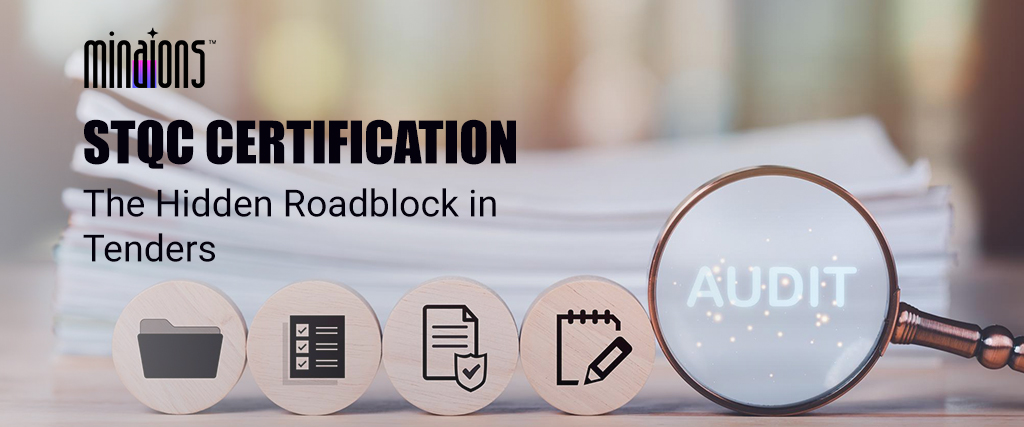Complete Tendering Terminology Guide By Minaions

Understanding tendering and procurement terminology is essential for vendors, suppliers, and consultants involved in government or corporate bidding processes. This comprehensive glossary explains the most important terms in the correct sequence.
General Tendering Terminology
Tender – A formal invitation issued by a government entity inviting bids for the supply of goods or services under specific terms and conditions.
Bid – The proposal submitted by a bidder/vendor in response to a tender, including pricing, timelines, and compliance documents.
Bidding Document – The complete set of documents (technical and financial) provided to the bidder by the government authority for responding to the tender.
Request for Proposal (RFP) – A document inviting detailed technical and financial proposals for complex projects, especially in IT, infrastructure, or consulting.
Request for Quotation (RFQ) – A simplified version of a tender that seeks pricing details for a defined product or service, typically used for lower-value procurements.
Expression of Interest (EOI) – A pre-bid stage document issued to shortlist eligible bidders who are then invited for a more detailed RFP.
Letter of Intent (LoI) – A document issued by the tendering authority indicating the intent to award the contract to the selected bidder.
Letter of Acceptance (LoA) – A formal acceptance of the bid submitted by the vendor. This precedes the signing of the contract agreement.
Work Order / Purchase Order (PO) – The official order issued to the vendor after LoA, detailing deliverables, timelines, and payment schedules.
Eligibility and Compliance Terms
Technical Criteria – Requirements related to prior experience, capabilities, certifications, or technical specifications of the product/service.
Financial Criteria – Minimum annual turnover, net worth, or profitability thresholds the bidder must meet.
Pre-qualification Criteria (PQC) – Preliminary conditions the vendor must fulfill to participate in the tender process.
Earnest Money Deposit (EMD) – A refundable security deposit submitted along with the bid as a token of commitment.
Bid Security Declaration – A document that replaces EMD in some tenders where the bidder undertakes not to withdraw or modify the bid.
Performance Bank Guarantee (PBG) – A financial guarantee submitted by the winning bidder to ensure performance of the contract.
Security Deposit – An amount withheld or deposited to cover any breach or damage caused during execution of work.
Process and Evaluation Terms
Two Bid System – A process where technical and financial bids are submitted separately. Financial bids are opened only if the technical bid qualifies.
Single Stage – Two Envelope Bidding – Both technical and financial bids are submitted together but evaluated in stages.
Tender Opening Date – The date when submitted tenders are opened by the procurement authority in the presence of bidders (offline/online).
Bid Validity Period – The duration for which the submitted bid remains legally binding and cannot be withdrawn.
Tender Evaluation Committee (TEC) – A panel of experts appointed by the department to evaluate bids based on technical and financial parameters.
Lowest Bidder (L1) – The vendor who has quoted the lowest price among all technically qualified bidders.
Technically Qualified Bidder – A bidder whose technical proposal meets all eligibility and compliance criteria.
Contractual and Legal Terms
Contract Agreement – A legal document signed between the department and the winning bidder, outlining scope, responsibilities, and terms.
Contract Value – The total monetary value of the work awarded to the vendor, excluding or including taxes as defined.
Scope of Work (SoW) – Detailed list of deliverables, services, and timelines to be fulfilled under the project.
Change Request (CR) – Any modification sought in the agreed scope, requiring mutual approval and possibly affecting cost and time.
Liquidated Damages (LD) – Penalties levied for delays or non-performance as per the contract.
Termination Clause – Conditions under which the contract can be ended prematurely by either party.
Blacklisting – Barring a vendor from participating in future tenders due to malpractice or non-performance.
Other Relevant Terms
GeM Portal – Government e-Marketplace: A procurement platform for various government departments for direct and tender-based buying.
CPPP – Central Public Procurement Portal (https://eprocure.gov.in): The central platform for publishing tenders across India.
NIC eProcurement – A government eTendering system developed by NIC (National Informatics Centre) to manage online bidding and bid submission.
Bidder / Vendor / Supplier – The person, firm, or company participating in the bidding process.
Joint Venture (JV) – A partnership between two or more companies for fulfilling eligibility or executing large projects jointly.
Consortium – A group of firms submitting a single bid, where responsibilities and roles are distributed formally.
BoQ (Bill of Quantities) – A detailed breakdown of the financial bid, listing unit prices, quantities, and total costs.
Corrigendum / Addendum – Modifications or clarifications issued after the tender is published, typically for changes in scope or timelines.
Tender ID – Unique identification number assigned to every published tender for reference and tracking.
NIT (Notice Inviting Tender) – The formal tender announcement containing key information like deadlines, eligibility, and instructions.
Types of Bids
Open Tender – A bidding process where any eligible vendor can participate by responding to the published tender.
Limited Tender – A tender invitation sent only to a pre-qualified or pre-empaneled set of vendors. Typically used for urgency or specialized works.
Single Tender / Nomination Basis – Issued to a single vendor without competition. Often used in defense, emergencies, or proprietary product situations.
Global Tender – A tender invitation open to international participants. Used for high-value or specialized projects requiring global participation.
Two-Stage Tendering – Involves two stages:
Stage 1: Submission of conceptual/technical proposals without price.
Stage 2: Revised bids with commercial details after clarifications.
Reverse Auction – An online bidding mechanism where shortlisted vendors compete in real time to quote the lowest price.
Rate Contract Bidding – A type of bid where prices are fixed for a certain period, and quantity is drawn as per requirement over time.
Framework Agreement – A long-term contract with one or more suppliers for repeated purchases at pre-negotiated terms.
Lump-Sum Bid – A fixed-price bid for a defined scope. Common in construction or turnkey projects.
Item-Rate Bid – Bidders quote unit rates for each item/work. Payment is made based on actual quantities executed.
Bid Evaluation & Submission Terms
Financial Bid (Commercial Bid) – The section where pricing and cost components are listed, opened only after technical evaluation.
Technical Bid – The section detailing vendor capabilities, methodology, experience, certifications, and other compliance.
QCBS (Quality and Cost Based Selection) – Evaluation method where both technical and financial scores are weighted (e.g., 70:30).
LCS (Least Cost Selection) – The technically qualified bidder with the lowest financial bid (L1) is selected.
Bid Submission Deadline – Final date and time before which all bid documents must be submitted.
Bid Opening Date – Official time when the bid envelopes are opened (physical or digital) in the presence of vendors or online.
Bidder Clarification Meeting / Pre-Bid Meeting – A formal session where vendors can ask questions regarding tender scope, evaluation, and terms.
Bid Tabulation – A comparative statement listing all bids received, often used by the evaluation committee.
Legal and Disqualification Terms
Deemed Non-Responsive – A bid that fails to meet mandatory compliance or eligibility and is disqualified from evaluation.
Conflict of Interest Clause – A provision to prevent vendors from being involved if they have conflicting business interests in the same project.
Debarment / Suspension – Temporarily disallowing a vendor from participating in tenders due to misconduct, poor performance, or legal issues.
Bid Forfeiture – If a bidder withdraws post-submission or fails to sign the contract after selection, their EMD is forfeited.
Contractual Models
Turnkey Contract – A contract where the vendor is responsible for the entire delivery — from design to deployment — with end-to-end accountability.
Build-Operate-Transfer (BOT) – A project model where the vendor builds and operates the infrastructure for a certain period before transferring it to the government.
PPP (Public-Private Partnership) – Long-term cooperative arrangements between public and private sectors for infrastructure projects.
BOQ (Bill of Quantities) – A document in the tender listing quantities and work items for pricing. Vendors must fill this in the prescribed format.
Portals & Systems
GFR (General Financial Rules) – A set of government rules for procurement, financial decision-making, and tendering processes.
Manual for Procurement of Goods / Services / Works – Comprehensive documents issued by the Ministry of Finance detailing procurement procedures, bid processes, and selection methods.
CPP Portal – Central Public Procurement Portal (https://eprocure.gov.in), used by ministries/PSUs to float tenders above a certain threshold.
GeM Bid / GeM Direct Purchase – Procurement options on the GeM portal: "Bid" for competitive selection and "Direct" for low-value or fixed-rate procurement.



